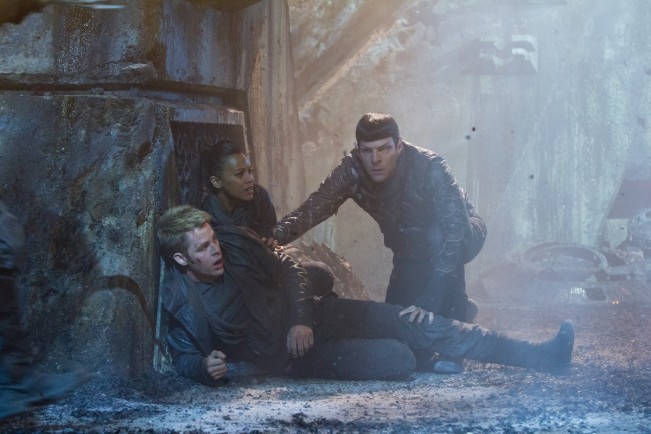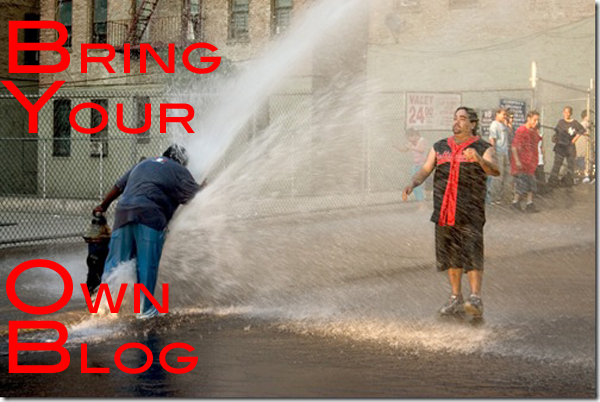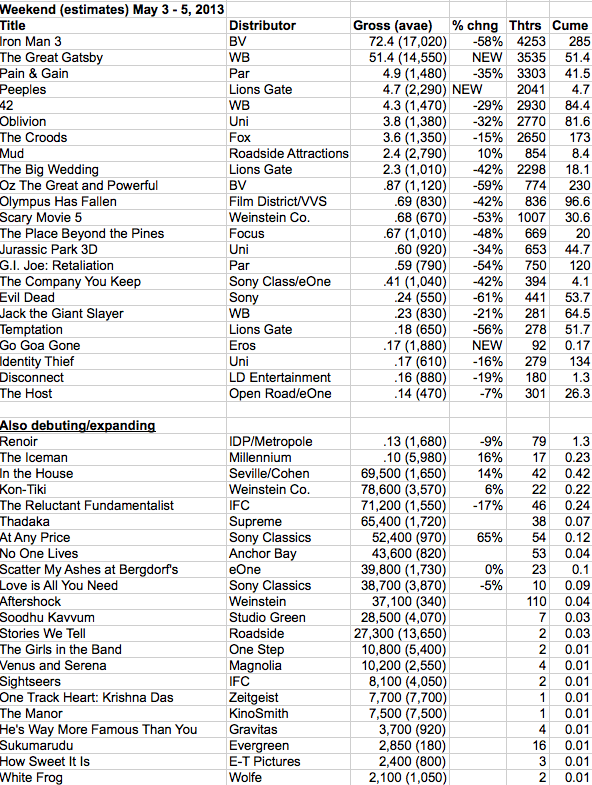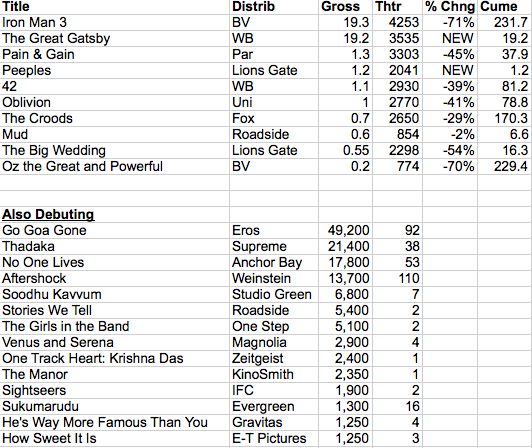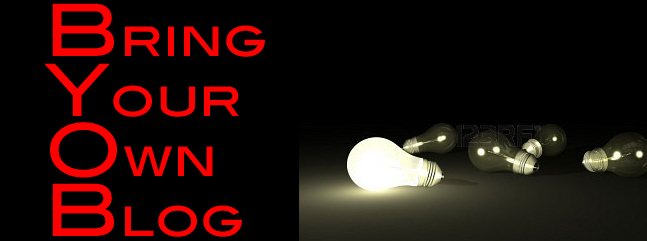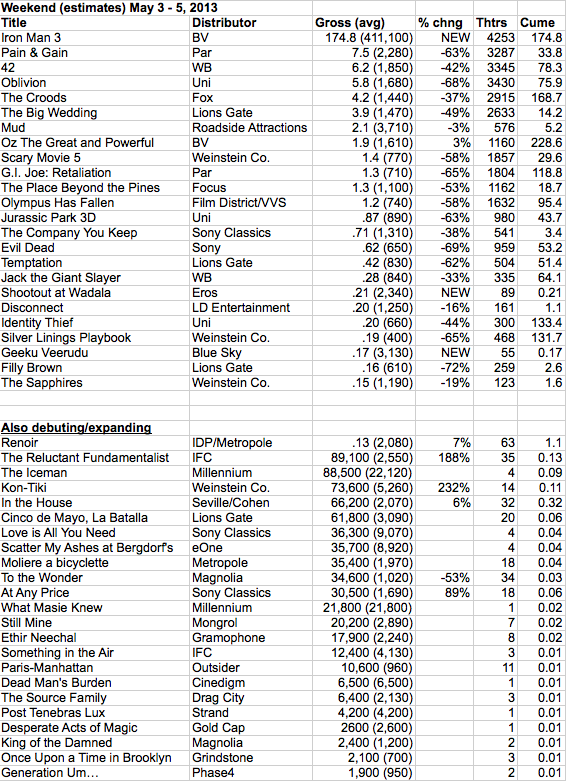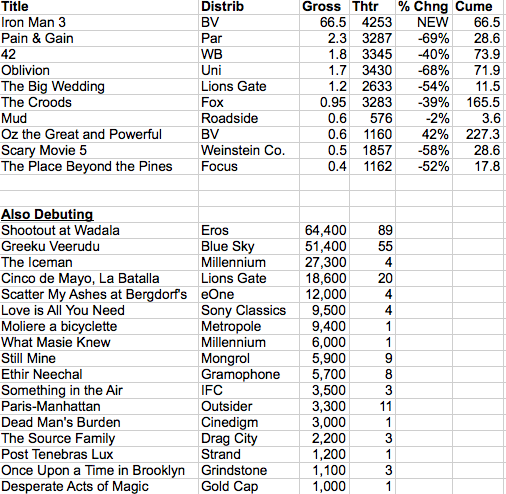The Hot Blog Archive for May, 2013
Cannes Day 2: Girls Just Wanna Have… (Part 2 of 2)
The second half of the Girls In Trouble Cannes combo (though there was a rancid Gondry cherry on top) was Sofia Coppola’s The Bling Ring. And this is what I saw…
A combination of Somewhere (but without the sliver of light that Elle Fanning brought to it) and Marie Antoinette’s happy vulgarity. The combination is odd, as even the pop music party that Coppola is known for is actually off the beat here. I would go so far as to suggest that Ms. Coppola may well have cut off the natural rhythms of the music with the intent of hitting a discordant note.
In fact, I think Bling was shot and cut to avoid the clean, easier to swallow, MTV aesthetic in which the girls think they live.
To make The Bling Ring more “fun” would be, I think, to buy into what Coppola is clearly sick of being sold. I’m not sure the strategy always works, but I can’t imagine a better choice. This is a film about imitated success and deluded images of achievement.
It is—Word of the Day—banality cloaked in champagne and expensive shoes. The fact that Paris Hilton doesn’t realize that the joke is, well, her, is the perfect measure of Coppola’s success. There is no “there” there because, in fact, there is no “there” there. How entertaining is that meant to be?
I love the unspoken hierarchy that the group starts to place on the expanding number of celebrity homes. Paris is always The Best Place To Be. By the time they get to Megan Fox’s nice, but average house, it’s downright boring.
Another interesting part of the film is just how minor the ambitions of the group are, aside from doing as they please. I don’t approve, but I am pretty sure that Coppola found just the right note of vacuousness in this film.
There is also a fascinating absence of sex in a film loaded with drugs and money and good-looking young people. A couple of the six or so blingers seem to have a sex life… but most seem to be a false in that as in their image polishing.
The truth is, I need to see it again to really get a handle in it. I am pretty sure Coppola was working in negative entertainment space. As the ring heads into their fifth or sixth robbery, shot only from a distance like rats in a maze, I was convinced that there was more than the surface of the surface on this film.
For the record, Emma Watson is pretty much perfect the whine of Alexis Neiers. You will love to hate it. And the star of the film really is the group’s ringleader, played by Katie Chang, who is a real find. But this is a director’s film, love it or hate it. Good performances all around, but it is Sofia’s show, first and last.
1 Comment »Cannes Day 2: Girls Just Wanna Have… (Part 1 of 2)
Day Two of the festival continued to drip from the sky and on the screen as teens in trouble (or are they?) was the theme of the day.
You couldn’t really pick two more different views of teenage girls than Francois Ozon’s Young & Beautiful and Sofia Coppola’s The Bling Ring. The first is an intimate eight months with a 17-year-old, observing and never forcing her subtext to the surface, any more than one can with any 17-year-old girl. The other is all about surface, as a group of teens (all but one a girl) say everything they think all the time… but with nothing of significance to say, simply vomiting up their fame-driven view of happiness and success.
Interestingly, in both films, a male character who is conscious, but not really ready to express wisdom, is the “narrator,” if you will, or at least the point of entry.
Jeune & Jolie (Young & Beautiful) is another Ozon drama that is as dry as his campy films are wet. It’s hard to write about the film without spoilers, as the piece watches a young woman make choices that the audience is never quite able to anticipate. From the very first shot, in which she is being watched on a private beach cove from a distance, deciding whether she might dare to take her top off to sunbathe, to the very end, in which she engages a “ghost” of herself, the whim and pain of youth is really all that guides her.
I expect that many writers will have a hard time getting over an often-naked beauty as anything but exploitation, not unlike people unable to get past Richard Pryor’s language. There is a prudish attitude amongst many seemingly hip people that is spiked by the idea of a film actually addressing sexuality without clear (perhaps harsh) judgements. This is one reason I love Ozon as a filmmaker. He tells stories that almost no one else does, about people who have power or assets or confidence. He does not artistically abandon these people because they “have no right” to complain… who might be unsympathetic because they don’t suffer “the right way.”
For me, what completely clicked in Young & Beautiful – and I saw it twice on the day – is that it captured the terse, illogical, stuttering, passionate, dispassionate, disappointed, angry, thrilling journey of a young woman who is profoundly empowered by the birthright of her looks. Really, it isn’t that much different than other girls’ struggles. It’s simply heightened by the peculiar asset of her looks and the choices she makes.
Moreover, the film speaks to the ongoing struggle of many women with this power… the unspoken truths, the changing roles, the wildcard in a life. No woman in the film is living a life completely on the surface.
So far, the response of female critics I have heard from and read has been dismissive. But not to put too fine a point on it, this story may seem absurd and unreal to some, but I know more than one of these women. I grew up with a slew of them. And their seemingly high-drama turn can be, in reality, quite banal.
It is as obvious and unimaginably convoluted as… well… women. And I mean that in much the way I would suggest that men tend to be much simpler, lacking the mystery that makes women irresistible to the heterosexual male (which is no excuse for male self-indulgence, another issue altogether).
The discussion of Ozon’s sexuality is an interesting one, which is unlikely to be much engaged. He makes a lot of movies about female power, whether the dramas or the high camp. Does the inclination of the filmmaker matter when it comes to putting the work in perspective? Hmmmm…
7 Comments »Star Trek Babies 2: Spoiler Space (Spoilers)
Cannes Day One: Drizzling
And so, on the morning of Day Two, a look back at Day One.
As the week progresses, the bubble we each travel in begins to dissipate. But on Day One, familiar faces, remembering the rhythm of the year before, trying to make good choices, getting the wireless and phones to work right, getting over the hotel room… It’s the first day at rich kids boarding school.
The Great Gatsby had already been popped for those of us in the U.S, bubble, so there was a sense of ennui to go with the steady drizzle from the start. I, personally, was not done with Gatsby, and after viewing the first hour again, I am still not done with Gatsby. I lean on the positive side of the meter for the film and re-viewing the first hour pushed me closer to the possibility of loving the film. I saw in in a WB screening room and seeing it on the big screen, even from a bad seat,was a better experience, scene after scene.
The biggest revelation for me was that it was much funnier than I remember. Luhrmann laid in a whole bunch of Easter egg references which I really hadn’t connected with the first time through, particularly in music choices (not just the existence of Jay-Z).
Luhrman remains one of the lazily discarded filmmakers of this era. Critics just won’t look past the surface much, almost angry at him for his ambitions. Anyone can fairly hate anything… if they have made a real effort to engage it first. I think there are a bunch of writers out there who just refuse with Luhrmann… on false principle.
Getting To Cannes
Heading to Cannes felt very different this year. Firstly, I had a firsthand sense of what I was getting into. Secondly, no video crew this year, so less sense of parenting. Thirdly, no pressure to shoot interviews… though I will surely shoot some interviews.
I made the decision that this year the festival would be about writing and discussing the movies first. That doesn’t mean that there won’t be video or parties or other froufrou, but I haven’t gone to one of the 3 major international film festivals without a crew in about 5 years. I miss it. I still see lots of movies I love when I am shooting, but the focus is just plain different.
The trip from LA to Cannes has been up and down. Down, my big self assigned a middle seat for an 11-hour, overbooked flight. Up, the ticket guy managed, somehow, to get me an aisle. Down, coffee spilled down my entire right side. Up, endless begging for forgiveness and a sleeping outfit from 1st class. Down, no time to explore Zurich airport. Up, a great taxi driver in Cannes. Down, a hotel that feels like it’s at the bus station. Up, a decent room 4 blocks from the Palais.
The biggest drama was at badge pick-up. I decided to add a Market/Marche badge this year to take full advantage of its benefits. And with ID, I had it in a flash. But I was told that my press pass had been canceled. WHAT?!?!?! Basically, the primary focus, for me, is on press screenings for competition films. A market badge won’t get me that access. A press badge has limited access in the market, but will mostly get me where I want.
I was told to e-mail the press office and hope for an answer the next day (now, today). That seemed a crazy answer. But there is an air of fear about the Cannes Fest infrastructure… lots of talk about badge color and attitude. I didn’t find that last year, but a stranger in a strange land without language skills makes one vulnerable. Nonetheless, I insisted my way up 3 flights to the press office, amidst “Don’t go there”s and “no one is there,” and “everyone is gone”s and found Geraldine, who took 30 seconds or so to discover that my press pass was in fact, intact. Then I had to get back to the basement, get told by more security to leave because things were closed, find one of the people who had previously helped me–still manning her “closed” booth–and explain… and voilà, my press badge was there.
I guess the moral of the story is to be very polite but aggressive when you have real cause to do so. I never had to raise my voice or screech about the length of my journey or melt down. I just had to run up and down stairs/escalators and not take shrugged shoulders as an answer. Many staff/volunteers were as lost as I was on this day before opening. We’re all just trying to do our jobs.
Of course, then it was on to La Pizza Cresci, where I found myself at the festival within the festival, as always. No Tom Bernard yet, but there were literally dozens gathered for pre-game. I even got to reminisce about Bingham Ray selling Bowling For Columbine to Chris McGurk in that very room du cheese.
So I am here. In one piece. Luggage intact. And away we go…
4 Comments »Weekend Estimates by Jay Klady
Happy Mother’s Day!
It’s a solid hold for Iron Man Three. Anything under a 60% 2nd weekend drop for an opening of that size—not a very big sampling—is a winner. The world has changed. Moreover, nearing $950m worldwide, it’s running just a bit behind Avengers, and is now looking like a $1.3b movie… at minimum. It’s remarkable how “standard” billion-dollar grossers have become in the last 5 years, when, in 2008, Dark Knight joined Pirates 2 and Titanic as the only first run billion-dollar grossers.
The biggest story of the weekend is Baz Luhrmann’s emotionally-disturbing-to-many-critics-over-40 The Great Gatsby. They stabbed it with their steely knives, but they just couldn’t kill the beast.
Not only is this a couple million short of triple any previous Luhrmann opening, but it is easily the biggest “2nd weekend of May” opening in the last decade aside from the first JJ Abrams Star Trek. In fact, it’s double or better any “2nd weekend of May” opening aside from Trek and Dark Shadows, which was about $20m behind. The slot, on one of the two biggest summer power alleys, is usually counterprogrammed opposite the big “1st weekend” opener. And it was here… to great success. What should really scare critics who hate the film is that Luhrmann’s m.o. is long legs, not big openings. If Gatsby is a $250m+ domestic movie, it will probably be a $500m+ worldwide movie… and then, Baz will actually be quite bankable, even without Leo. Congratulations to him. Even if you don’t like his aesthetic, he is an artist who is very serious about his work and does not deserve mockery. He’s no f-ing Jeff Koons.
Also new, Peeples, the worst opening for a movie with Tyler Perry’s name on it… ever. Terrible title. Cool print and outdoor ads that didn’t make the movie that was being sold clear. And I will be curious to see how much of the “black audience” was sucked up by Gatsby. Could be a big number with the musical push by Jay-Z and others.
Now… go take care of mom.
33 Comments »3 Days Of Broadway
April is always an interesting time to land in New York, trying to figure out what to see on Broadway. There is an invariable pile-up of new shows waiting to open and get Tony nominations within a few weeks, hoping they will be propelled into long runs. (This started before Harvey Weinstein started using the same principle for Oscar with December launches.)
When I was preparing for a trip to The City a couple of weekends again, I was looking at a bunch of shows that were just about to open and a few that had been on the boards for a short while. To be honest, the New York Times profile of Tim Minchin had convinced me that I had to see “Matilda,” for better or worse. I have found myself misled in this regard by The Gray Lady in the past. They tend to get crushes. And for that reason, I eliminated “Lucky Guy” from the top of my list. They just love Nora Ephron so much that I don’t trust a word they say when they are in the bloom of love. But the feature on Michin had enough content from the show to convince me… the great lyrics. If there is anything that has been lacking in new musicals on Broadway in the last five years, it’s great lyrics.
I was a sucker for Bette Midler on Broadway. I have seen her live in various venues over the years and she always kills. I was a little scared that I was going to The Booth to see her Sue Mengers show as I was a little crushed by Vanessa Redgrave’s miscast turn as Joan Didion a few years back in a one-woman show on the same stage. But this was the first ticket I secured.
There’s a funny thing about going to Broadway over a bunch of years. Theaters have history. And this was also true for “Matilda” at The Shubert, where I had seen “A Chorus Line” many years before and “Spamalot” more recently, both quite joyously.
And what about show 3… which is all I had time for? An actor suggested “Assembled Parties,” which scared me a little… just sounded dry and overly smart. I always had mixed feelings about “Kinky Boots” as a movie, so another $250 to see the show seemed iffy. I thought I might finally go see “Book of Mormon,” but a not-insanely priced orchestra ticket turned up on Telecharge… and then mysteriously disappeared in a cloud of tech problems with their site. I quite wanted to see Sigourney Weaver in the new Durang, so that was near the top of the list.
But it ended up being “The Nance.” I think Douglas Carter Beane is one of the great writers working on Broadway today. And Nathan Lane is always great, even if the hysteria level can overflow in a bad show.
“The Nance” is an interesting experience. Lane is terrific in what is mostly a dramatic part. The rest of the cast is also excellent. But the play is both well-written and a bit frustrating. The backdrop is the dying days of burlesque, in which there was often a mincing “nance,” who was–so the show tells us–usually played by heterosexuals… gay blackface. But this story is about a gay man who is also playing the nance in the Irving Place Theater in New York, already carrying the heavy weight of being a minstrel, mocking his own sexuality, wearing “gay face” to make a living.
The other storyline is the end of burlesque, which I kinda loved. It’s not that I love corny, broad material. It’s that it’s a snapshot of a moment in entertainment that has passed, but while it was around, it was the focus and passion of the performers in a real way. I think the show honors the serious intent behind that work, while still not being shy about expressing how threadbare it was even then.
The problem with the show – why it doesn’t feel like a clear home run to me – is that the homophobia that floats through every moment of the show is also, certainly in NY theater, also a part of the past. This is not to deny the existence of harsh and even violent homophobia in the culture still. But today in New York, the mayor is obsessed with the size of your soda, not driving homosexuals off the island of Manhattan.
This is also what is difficult about Holocaust dramas. There is a real purpose in continuing to remember what people are capable of doing to one another. It should not be forgotten. Nor should pre-Stonewall gay life in NY or life a decade after Stonewall (like “Torch Song Trilogy”) or in the start of the AIDS era (like “The Normal Heart” or “Angels in America”). But it’s very easy to miss by a small amount and not quite find a clear, compelling argument that engages an audience for an hour or more of a theater experience.
The demons that Carter Beane gives to Lane’s character are familiar – Osborne’s “The Entertainer” being the great example – but the addition of realistic gay paranoia in New York in the late 30s, while compelling, seems like either one too many layers or one not quite deep enough. It’s not a wide miss… but it doesn’t quite hit the target either.
Still, I am glad I saw the show, loved the performances, and the issues linger for me. So maybe it will seem even better in time.
Bette Midler is no less a gay icon than Mr. Lane. And if Sue Mengers was a public figure, she too would be the kind of brassy, fearless talker who would be able to play the bathhouse circuit. Of course, Mengers was much more private. Her fame and reputation were intense within the inner circles of Hollywood and amongst those she brought into her world.
The show, “Sue Mengers: I’ll Eat You Last” is a memory play, all as told and performed by Ms. Midler herself. It’s the end of Mengers’ run as one of the very biggest agents in Hollywood when we meet her and she can’t seem to stop herself from telling her best tales, even if the audience represents someone she doesn’t know who has basically wandered into her living room. But because the play is showing us Mengers as she knows her power is waning – she is waiting for a call from Barbra Streisand to fire her – there is a sense of melancholy through the whole thing.
Midler is charming, as always, and can tell the hell out of a story. But there is an element of the real fire that tends to drive people like Mengers that is missing. She’s already given up the fight, really. So it’s a bit of a glory days remembrance. We get the skill set and the charm of the woman… but outside of turning catty, funny phrases, the – for lack of a more appropriate word – “cunt” is missing. I’m not saying that is what she was or all she was… but in my experience with men and women who wield great and fragile power, there is always a big pot of cunt in there bubbling away somewhere. They are like Dilithium Crystals on Star Trek. When they need some more power, it always comes down to those crystals… or in the case of agents, male or female, some serious cunt.
(Sidebar: This is also what is missing from most of Madonna’s acting performances. She is willing to be the diva, but she is unwilling to acknowledge her inner cunt (I’ll stop using that word now) and so what she exudes so naturally as an icon is not there when she acts. She can be a terrible, angry, vengeful character, but we don’t see that boiling evil deep inside, so it rings false.)
So, did I enjoy an evening with Bette Midler? Yes. Very much. Did I feel like I really met Sue Mengers? No, not so much.
The other problem is that the show is utterly missing a second act. It’s one long first act of storytelling then as the outside light begins to fade on the interior w/ exterior set, the maudlin begins. The maudlin is good. But there is a flavor in the middle missing. There is a charming and effective stunt to break things up… but that doesn’t make the structure right.
So… two good, slightly off shows… and one piece of true, forever, theatrical magic.
Every five years or so, something lands on Broadway that is, simply, undeniable. It’s truly unexpected, gloriously executed, both dry and moist, and reminds you why the live theater is worth the investment, financially and emotionally.
“Matilda” is that show right now.
As noted above, I was a little fearful that NYT had a new girlfriend and was telling us all how great she was. But they were 100% right… perhaps underselling a little.
The stage design by Rob Howell is on top of you from the moment you walk into the theater, a 3-dimensional use of the stage and the proscenium that will, as the show goes on, recreate itself in new and delightful ways, like a Rubik’s Cube of design. The key shape is that of a Scrabble tile, of which there are hundreds. That shape changes into all kinds of spaces on the stage, from a library to a bedroom to a schoolyard to a broken down shack. The last piece of stage design I saw that was nearly as impressive was the sliding panel and rotating stage of “The Light In The Piazza.”
And then, the show.
It’s very much the “Anti-Annie.” What if Rooster and Lily took Annie home and tried to have a normal life? (It also reminded me a lot of the Ray Davies “Quiet Life” sequence from Julian Temple’s Absolute Beginners.) That’s where “Matilda” starts. In this case, it’s Mr & Mrs Wormwood (Gabriel Ebert, Lesli Margherita) as the debauched couple, with the blush of youth and passion has long worn off… as well as any morality of any kind. They see Matilda much as most of us might see Annie after a few hours in the real world. Why is she so irritating?!?!
But instead of it embodying Annie’s endless sunshine, Matilda sees the world in realistic (and sometimes, hyper-realistic) colors. Matilda is smarter than anyone in her circle. But as smart as she is, she is still often sorting through facts, not ideas, as even precocious children do. Talk to her about a hard knock life and she’d essentially respond, “Why would anyone live their life like that?” But she has one Achilles heel… on thing she can’t quite make better with brainpower… a lack of real familial love.
When Matilda ends up at Crunchem Hall Academy, we meet the kids, one of the many magical elements of the show. Director Matthew Warchus bravely mixes a cast of 8 real kids with occasional additions of adults in kids clothing (for dance numbers and stunty things). Again… an “Annie” thing. But “Matilda” seems to rely on these kids through a lot more of the show than “Annie.”
As with Matilda, her “orphan pals” are not all sunshine and light in the face of a hideous life in a hideous world. They are less rebellious than she, but she will show them the light in time. The kids are, as in most drama with kids, representations of all kinds… the fat kid, the Asian kid, the wimp, the bully, etc. But as written in the book by Dennis Kelly, they are kept fresh and surprising.
At Crunchem, “The Natural” (aka Matilda) has a figure of light, in Miss Honey, and a figure of darkness in Miss Trunchbull, who is in charge. Truchbull, a former Olympic shotputter, is played unforgettably by Bertie Carvell. There are actually two drag performances amongst the five Best Actor in a Musical nominees for Tony this year, though the other one, in “Kinky Boots,” is about drag while Carvell’s Trucnhbull is of the British tradition of men playing women’s roles, never winking at the audience. Trunchbull is what Matilda could become if she never found love… angry and paranoid and operating in fear. Miss Honey, played by Lauren Ward, with a gentle heart and a smooth voice, is a reflection of what Matilda could be come if she never learned to stick up for herself.
For all the complexity of characters reflecting one another, very literary lyrics (if you have a hard time with English accents, you may need headsets or really good seats or both), the seamless production, the amazing performances of the kids and the adults, the very cool sets, and the occasional special effect, “Matilda” comes down to very basic, very emotionally driven themes. There is right and there is wrong. We know what they are, whether we are 6 or 60. And people deserve to be loved, especially when they are willing to give love.
Roald Dahl was a funny, tough guy. The darkness reflects life, just as the darkness of The Brothers Grimm, Hans Christian Anderson, and others. In many ways, Matilda is like a Grimm hero, constantly navigating the danger… of her family, of her teachers, of her own power.
There is so much that could have gone wrong with this material. Matthew Warchus’ achievement is enormous, as the tone and the pace and the performances never take a wrong step. The whole show hands power to little Matilda (I saw Sophia Genusa and can’t imagine a better Matilda… but would love to see all four young ladies in the role), So when she takes center stage and puts those hands on her hips, the audience is ready to be with her, 100%. That’s not just the performance or the script. That’s in a show’s design.
I was really blown away by this show. It was not as “adult” as either of the two straight plays I saw, but this “kids show” reminds just how much drama can be every bit as powerful when it knows exactly what it wants to be.
If you can’t get to Broadway or are not willing to pay insane prices to see “Matilda” there, you will get plenty of chances to see it again… on tour… in school productions… in community theaters… everywhere theater lives. This is one for the ages. Pure pleasure.
4 Comments »Weekend Estimates by $174m Opening Puts Us Behind Last Year Klady
A $30 million jump from the first in the franchise to the second, released two years later… though the second didn’t quite equal the first in total domestic gross.
And not, an estimated $50 million jump from 2 to Three… even though #2 was not well-liked… but there was The Avengers in between.
The baseline is that it’s good to open the summer if you have a franchise that will open big. Five of the 10 biggest summer openings of all-time are from the “first weekend of summer,” aka the first weekend of May. All 5 are superhero movies, by the way.
If you’re wondering how significant May is to opening weekends, 11 of the 24 all-time $100m opening happened in the month of May. Following that are November with 5 and July with 4. November’s mega-opens are limited to Potter & Twilight. July, Potter & Pirates. June has 2, one being the 2nd Transformers and the other being the final Toy Story. March is the most interesting spot, though only 2 have turned the trick there, Burton’s Alice remake and the launch of Hunger Games, of the “if you build it, they will show” phenomenology.
Amyway… I don’t really have anything interesting to say about the domestic Iron Man Three opening itself. It doesn’t, as an event, prove that theatrical is strong. It is the #2 domestic opening ever, but somehow feels like it’s been done before… a phenomenon of annual “we’re the biggest ever” opening growth. (Only Jim Cameron has outrun that… twice.) It does suggest that front-loading is continuing to be what studios want.
IM3 is already the #1 Iron Man movie—total worldwide gross—of the series, thanks to the rest of the world being almost $200 million ahead of any IM movie of the past. It’s generated $505m in the rest of the world through this American opening weekend, which also, by the way, dwarfs the $335m that The Avengers had in its coffers internationally through their opening weekend.
In other words, fuck worldwide day-n-date. Disney has the new killer op in distribution of big, loud movies. Fill the tank outside of the US before landing here. AKA, go where the suckers are. Go early and don’t let the United States be the arbiter of taste in any way.
And you know that the movie universe is topsy-turvy when WE are the ones holding out for higher quality.
For the record, I’m not saying that Iron Man Three is junk. It’s certainly better directed that either of the first two films in the series and even though it cops out pathetically on its Black-ian ambitions (another odd moment… as we hold Shane Black as Mr. Arty Edge, even if many of us loved his sleekest, smartest film, Kiss Kiss, Bang Bang), it is not unfair, in my eyes, to call it the best of the lot. But it’s still a deeply flawed movie. Not really good… but not offensively bad.
So that is the trend line to watch. Warner Bros, the international-selling superstar of the 90s into the early 00s, is rolling out Man of Steel in its normal method, basic worldwide day-n-date, which they pioneered, but everyone caught up with. Fox which has been pushing the international envelope in the 00s is sticking to pretty traditional day-n-date for The Wolverine. Paramount is in similar mode with World War Z. And Sony, with Roland Emmerich’s White House Down, isn’t even pushing day-n-date, with a worldwide rollout over couple of months, even without an Olympics of World Cup.
This could be the moment when the American media finally gets serious about international box office. It’s very possible that in the next two weeks, the Iron Man Three international gross will pass the previous best worldwide gross for an Iron Man film. It is distinctly possible that Iron Man Three will be a $350m domestic movie… and do double that internationally.
And when was the only other time in the last decade of box office $ boom we saw something like that 33/67 split from the summer’s top film? The final Harry Potter two summers ago… but that was unique to Potter, which never once in eight tries did as much of 335 of its box office domestically. (The first one came closest with 32.6%.)
This is the box office story to watch this summer. If The Hangover 3 goes $400 international/$200m domestic, it’s a pretty strong signal… not of the failure of domestic theatrical, but of the intentional (I love when the industry pretends things just happen… sometimes they do… mostly, they are by design) change to the ecology that will create a new domestic film industry vacuum that will need to start being managed in earnest.
85 Comments »Friday Estimates by Iron Klady 3D
So are we going to get a bunch of people saying this Iron Man Three opening is “disappointing?”
I do think there is now “opening ennui.” IM3 is the 24th $100m domestic opening in history… the 14th in last 5 years. In other words, one of 3 or 4 mega-openings this summer. Zzzzzz…
The only 3 non-sequels in the group are the first Spider-Man movie, which was also the first $100m+ domestic opening back in 2002, Alice in Wonderland, which is hard to call an “original” without gagging on it, and The Hunger Games, which is the only non-summer, non-November $100m opener ever.
As we saw last summer, the media can still wet its pants over an opening. But that was the break in the $200m opening barrier and a 22% jump over the previous all-time best opening.
All that said, as noted on Twitter earlier this week, this Iron Man is already the all-time international Iron Man and may well pass the total gross of the first in the series by the end of this weekend… certainly by next Friday. So Disney and Marvel doesn’t have to wonder about whether it did anything good or bad in production or marketing… people are buying tickets and that is, like it or not, the bottom line on big movies like this.
There are other movies in the marketplace, but no one much cares. 5 of the 8 holdover wide-release films in the Top 10 dropped at least 50% from last weekend.
The “top” indie for the weekend will be The Iceman, which brought an awful lot of firepower for $21k or so per screen on four for the weekend.
35 Comments »




